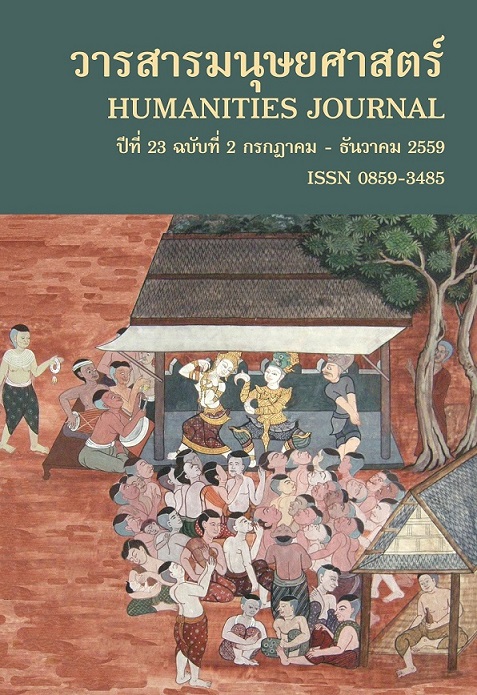โอตาคุ หญิงวิปริต และวิกฤตความเป็นชาย Otaku, Women Gone Crazy and a Crisis of Masculinity
Main Article Content
Abstract
บทความเรื่องนี้อภิปรายการนำเสนอวัฒนธรรมประชานิยมวัยรุ่นข้ามชาติจากญี่ปุ่น (เจป๊อบ) ผ่านตัวละครวัยรุ่นในภาพยนตร์ไทยสองเรื่อง คือ ใคร..ในห้อง (2553) และ อวสานโลกสวย (2559) ผู้เขียนบทความเสนอว่าภาพยนตร์สองเรื่องดังกล่าวนำเสนอภาพในแง่ลบของวัยรุ่นไทยที่เป็นแฟนคลับเจป๊อบ ประเด็นดังกล่าวแสดงให้เห็นอย่างชัดเจนในการนำเสนอความผิดปกติของตัวละครหญิงที่สัมพันธ์กับวิกฤตความเป็นชายของตัวละครที่มีบุคลิกแบบโอตาคุในเรื่อง ภาพตัวแทนเหล่านี้สะท้อนความวิตกทางศีลธรรมของผู้สร้างภาพยนตร์ต่อการสร้างอัตลักษณ์ทางเพศของวัยรุ่นไทยผ่านวัฒนธรรมป๊อบญี่ปุ่นข้ามชาติ ในการเสนอประเด็นดังกล่าว ภาพยนตร์ทั้งสองเรื่องได้ใช้ประโยชน์จากฉากบ้านและห้องที่ห่างจากสายตาผู้ใหญ่ เป็นสัญลักษณ์ของการหนีไปจากโลกปกติที่กดดันวัยรุ่นให้ทำตามความต้องการของสังคม ในสถานที่ที่ผู้ใหญ่เข้าไปควบคุมไม่ได้นั้น วัยรุ่นได้ใช้สื่อและเทคโนโลยีในการปลดปล่อยตนเองไปสู่โลกแฟนตาซี ในภาพยนตร์ทั้งสองเรื่อง บ้านและห้องสัมพันธ์กับความวิปริตของตัวละครหญิงและความอ่อนแอด้อยสมรรถภาพของตัวละครชาย โลกแฟนตาซีของวัยรุ่นจึงทั้งแปลกปลอม ท้าทาย น่าหวาดระแวง และอันตราย และจึงถูกกล่าวโทษว่านำมาสู่จุดจบอันเลวร้ายเหนือความคาดหมาย เรื่องเล่าของภาวะสมัยใหม่ในภาพยนตร์ทั้งสองเรื่องนี้จึงสะท้อนความหวาดระแวงของสังคมไทยบางส่วนที่มองว่าเจป๊อบเป็นสิ่งแปลกปลอมที่อันตรายต่อสังคมไทย In this article, I discuss the representations of transnational J-pop culture in two Thai films: Who are you (2010) and Grace (2016). I argue that these films present negative images of Thai J-pop fans. This is clearly seen in the depiction of abnormalities of female characters who are related to the crisis of male characters who have Otaku-type personalities in these films. These representations reflect the moral panic of the Thai makers of these films toward the formation of gender identity in Thai teenagers through Japanese transnational popular culture. In both movies, this panic is conveyed through scenes set in house and room spaces that are remote from the gaze of adults. These symbolize escape from the everyday world which forces teenagers to conform to the demands of society. In these spaces beyond the control of adults, media technologies open a fantasy world into which teenagers may escape. The house and the room are related to the abnormality of the female characters and the weakness and impotence of the male characters. The teenagers’ fantasy world is foreign, challenging, untrustworthy and dangerous, and in both films, is to be blamed for the unexpected tragic endings of the films. Thus, the stories presented on both these films reflect the paranoia of certain elements of Thai society in which J-pop is viewed as an alien cultural influence which poses a threat to Thai society.
Article Details
Section
Academic Articles


